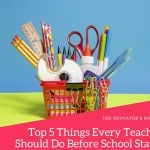“Just don’t smile until Christmas,” a more veteran colleague once advised me at the start of the school year. It never struck me as particularly wise when teaching a class of students.
Having had 23 classes of students since then, I’ve learned a lot about what to do and what not to do long before winter break. I’ve learned which bulletin board paper fades and which won’t. I’ve learned how to arrange back-to-school-night and what to do about early tattle-tales.
But more importantly, I’ve learned what to say to students and what not to say to them right when it matters most. You most likely have phrases you say too. Here are five important things I have learned that must be said early in my school year, which you may wish to consider adding to your repertoire. More importantly, here are also the reasons why you should say them and do so long before Christmas arrives.
#1 You are not allowed to fail in my classroom
This has been taped to the front, back, and above my door for over 15 years. Here is why: Once this sign is hung on your door, it forever changes the relationship between you and your student. From this moment on, that child sitting in your class knows that if they fail, you fail. It connects the two of you to their work for the entire year. From day one, tell your students they cannot fail in your class. Tell them that failure for them is a failure for you, and you do not accept failure. Failure is not an option. When a student fails to understand this, as inevitably they will, you will be in a different position to speak to them. Without the phrase, you will talk to them about how they need to reach their potential or perhaps have a better attitude about their work.
But now it’s your work, too. With the phrase, you will remind them that whether they wish to do either of those things is irrelevant-and the conversation will be about the actual, tangible “things” they must do to satisfy not just theirs but your standards. As the year goes on, replace the sign with “We do not allow ourselves to fail,” and when certain members of your class are ready, have them post their own signs, “I do not allow myself to fail.” This is more than how you change a child’s attitude; this is how you help transfer skills and mindset.
#2 It was my choice that you are here with us
This one has various versions depending on the type of teacher you are. I announce on Day One that every student in this class is here because I wanted them in my class. It’s a little fib, but so far, I’ve not been struck by lightning.
Mr. Courtney personally chose you. I may have liked some others, but I saw something in each of you here that I knew would be important to have in my classroom. When students need a private talk outside, I often remind them that I selected them to be here with me.
But why? There is much data to support the feeling of inclusivity that such a phrase gives students. Such data that supports how such a phrase might impact students who come from foster homes or separated families. There is a wealth of information that details the cultural disconnect that can exist between many teachers and their diverse population of kids. But really, it boils down to this: Regardless of who we both are, you belong here, and that is something I wanted.
#3 That isn’t true about you/I’ll bet that is going to change this year
For those who have been teaching for a while, we know well the types of things kids tell us in those early weeks. Kids tell you when they haven’t had success in previous years, and they often explicitly tell you how they feel about it.
I’m not smart.
My writing is sloppy.
I don’t like to read.
I can’t do art.
I’m bad at math.
But in my class, each and every comment like this is met with one of two phrases. Either I say, “that isn’t true about you,” or I say, “I’ll bet that is going to change this year.” Sometimes I say both. Why? It’s simple. The reason a student says negative comments about themselves in the first place is most often to test you, to see if you will respond differently than previous teachers (or previous family and friends). In tougher cases, kids will actually believe it about themselves, and counseling can be consulted for them. In either event, children need to know that a trusted adult sees the best in them or the potential for the best. If you aren’t trusted when you first say it, keep doing so and acting upon your words. Eventually, you will be.
#4 My standards are very, very high
Kids hear all manner of things about you before they enter your classroom. To kids, there is very little gray area. You’re either an old teacher or a brand new one. You’re either strict or fun. The class will either be easy, or it will be very hard.
Do yourself a favor and let kids know what you are all about on the very first day so they can clear up the confusion. For me, that goes like this: “I believe in working hard and smiling while I do it. No matter what you’ve heard about me or how fun I am, know I have very high standards. You will always be pushed to be better and better and better still. If that will be an issue, you should tell me now. You will have to rise to my standards.
#5 You will be safe here in all ways, every minute of every day
If you haven’t looked at statistics on bullying, including cyberbullying, you should. The simple fact of the matter is that your kids are most likely constantly worried and bombarded with threats socially and emotionally, and that underlines everything academically. A wise teacher understands that below grades lie the focus required to attain them. An informed teacher understands the reality of the children that walk in their door. An inspiring teacher knows they have just one year to positively impact a child that needs it most.
To assure that you can follow through on this promise, send home clear classroom behavior expectations to parents, which all become signed and returned. Furthermore, collect from students signed affidavits on Day One. In my class, we sign a document called My Civil Rights, which is posted, signed by every member. Each year I tell students that “this document is required to be a member of my class. I’m sorry, but if you do not sign it, I can’t have you here this year and you’ll need to go to the office and ask for a transfer.” In 24 years, I never had a kid go yet, and I’ve done it with all grades 3-6. What I have had is that when there is a mistake, everyone involved knows their right to be free of harassment.
Finally, always have a mailbox in your classroom where private messages can be placed. This tells kids that you are serious about handling issues that arise and sends a message to any child who might still be bullying others unbeknownst. Often this mailbox is filled with silly things that I dismiss. It gives kids a chance to vent, which kids need just like us. But it also helps me understand who is causing issues. When working with the school counselor, I can get a child whose name appears a bit too much in my mailbox support before they are in trouble. In rare cases, the mailbox gives me the information I need to file a CPS report, a duty all teachers must adhere to when needed.
#6 So I will accept no excuses
One phrase rules all of the above and binds them. Imagine, after making these five phrases common verbiage in your class for a couple of weeks. Imagine a teacher who has not. Now when the conversation leans towards things being done, which teacher can say, with conviction, “I will accept no excuses,” and know that there is an understanding between the students and the teacher about what that means?
But there is one final reason why I love initiating these phrases from Day One. Once you declare them to your students, it requires you to follow through every time. Try it. Even just one of them. Tape a note to your door that says, “You aren’t allowed to fail in this classroom,” and see how your students’ behavior and yours are affected. It’s a little like announcing that you plan to get in shape with 30 personal trainers at the gym for six hours daily. You’ve now got a full classroom to guide you to make decisions that are truly right for kids, even when you aren’t feeling like keeping to your promises.






